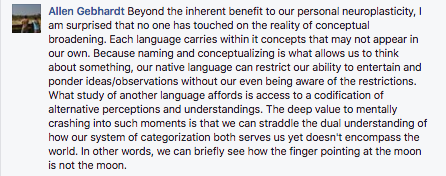My ability to speak multiple languages is a large part of who I am.* Admittedly, the more I languages I learn, the less mastery I have over each of the languages I speak. But I decided a while back I was ok with trading depth for breadth because I adore the process of starting from scratch, of gradually bringing once dormant characters to life, of working with my own insecurities and stubbornness as people respond in English to what must sound like pidgin German or Italian or Chinese, of hearing how the tone of my voice changes in French or Spanish, absorbing the Fanonian shock when a foreign friend raises his** eyebrows upon first hearing me speak English, surprised that my real, mother-tongue personality is far more harsh and masculine than the softer me embodied in metaphors of my not-quite-accurate French.***
You have to be comfortable with alienation to love learning foreign languages. Or perhaps so aware of how hard it is to communicate accurately in your mother tongue that it feels like a difference of degree rather than kind to express yourself in a language that’s not your own. Ferdinand Céline captures this feeling well in Mort à Crédit (one of the few books whose translated English title, Death on the Installment Plan, may be superior to the original!), when, as an exchange student in England, he narrates the gap between his internal dialogue and the self he expresses in his broken English to strangers at a dinner table. As a ruthless self critic, I’ve taken great solace in being able to hide behind a lack of precision: I wanted to write my undergraduate BA thesis (which argued that Proust was decidedly not Platonic) in French because the foreign language was a mask for the inevitable imperfection of my own thinking. Exposing myself, my vulnerabilities, my imperfections, my stupidity, was too much for me to handle. I felt protected by the veil of another tongue, like Samuel Beckett or Nabokov**** deliberately choosing to write in a language other than their own to both escape their past and adequately capture the spirit of their present.
But there’s more than just a desire to take refuge in the sanctuary of the other. There’s also the gratitude of connection. The delight the champagne producer in a small town outside Reims experiences upon learning that you, an American, have made the effort to understand her culture. The curiosity the Bavarian scholar experiences when he notices that your German accent is more hessisch than bayerisch (or, in Bavarian, bairisch, as one reader pointed out), his joy at teaching you how to gently roll your r’s and sound more like a southerner when you visit Neuschwanstein and marvel at the sublime decadence of Ludwig II. The involuntary smile that illuminates the face of the Chinese machine learning engineer on his or her screening interview when you tell him or her about your struggles to master Chinese characters. Underlying this is the joy we all experience when someone makes an effort to understand us for who we are, to crack open the crevices that permit deeper connections, to further our spirituality and love.
In short, learning a new language is wonderful. And the tower of Babel separating one culture from another adds immense richness to our world.
To date, linguae francae have been the result of colonial power and force: the world spoke Greek because the Greeks had power; the world spoke French because the French had power; the world speaks English because the Americans have had power (time will tell if that’s true in 20 years…). Efforts to synthesize a common language, like Esperanto or even Leibniz’s Universal Characteristic, have failed. But Futurists claim we’re reaching a point where technology will free us from our colonial shackles. Neural networks, they claim, will be able to apply their powers of composition and sequentiality to become the trading floor or central exchange for all the world’s languages, a no man’s land of abstraction general enough to represent all the nuances of local communication. I’m curious to know how many actual technologists believe this is the case. Certainly, there have been some really rad breakthroughs of late, as Gideon Lewis-Kraus eloquently captured in his profile of the Google Brain team and as the Economist describes in a tempered article about tasks automated translators currently perform well. My friend Gideon Mann and I are currently working on a fun project where we send daily emails filtered through the many available languages on Google Translate, which leads to some cute but generally comprehensible results (the best part is just seeing Nepali or Zulu show up in my inbox). On the flip side, NLP practitioners like Yoav Goldberg find these claims arrogant and inflated: the Israeli scientist just wrote a very strong Medium post critiquing a recent arXiv paper by folks at MILA that claims to generate high-quality prose using generative adversarial networks.*****
Let’s assume, for the sake of the exercise, that the tools will reach high enough quality performance that we no longer need to learn another language to communicate with others. Will language learning still be a valuable skill, or will it be outsourced to computers like multiplication?
I think there’s value in learning foreign languages even if computers can speak them better than we can. Here are some other things I value about language learning:
- Foreign languages train your mind in abstraction. You start to see grammatical patterns in how languages are constructed and can apply these patterns to rapidly acquire new languages once you’ve learned one or two.
- Foreign languages help you appreciate how our experiences are shaped by language. For example, in English we fall in love with someone, in French we fall in love of someone, in German we fall in love in someone. Does that directionality impact our experience of connection?
- Foreign languages force you to read things more slowly, thereby increasing your retention of material and interpretative rigor.
- Foreign languages encourage empathy and civic discourse, because you realize the relativity of your own ideas and opinions.
- Foreign languages open new neural pathways, increasing your creativity.
- Foreign languages are fun and it’s gratifying to connect with people in their mother tongue!
- Speaking in a foreign language adds another level of mental difficulty to any task, making even the most boring thing (or conversation) more interesting.
I also polled Facebook and Twitter to see what other people thought. Here’s a selection of responses:












The best part of this exercise was how quickly and passionately people responded. It was a wonderful testimony to open-mindedness, curiosity, courage, and thirst for learning in an age where values like these are threatened. Let’s keep up the good fight!
*Another perk of living in Canada is that I get to speak French on a regular basis! Granted, Québecois is really different than my Parisian French, but it’s still awesome. And I’m here on a francophone work permit, which was the fastest route to getting me legal working status before the fast-track tech visa program that begins today.
**Gender deliberate.
*** It really irritates me when people say French is an easy language for native English speakers to learn. It’s relatively (i.e., versus Chinese or Arabic) easy to get to proficiency in French, but extremely difficult to achieve the fluency of the language’s full expressive power, which includes ironical nuances for different concessive phrases (“although this happened…”), the elegant ability to invert subject and verb to intimate doubt or suspicion, the ability to couple together conditional phrases, resonances with literary texts, and so much more.
****A reader wrote in correcting this statement about Nabokov. Apparently Nabokov could read and write in English before Russian. Said reader entitled his email to me “Vivian Darkbloom,” a character representing Nabokov himself who makes a cameo appearance in Lolita. If it’s false to claim that Nabokov uses English as a protected veil for his psychology, it may be true that cameos in anagram are his means to cloack presence and subjectivity, as he also appears - like Hitchcock in his films - as the character Blavdak Vinomori “King, Queen, Knave.”
*****Here’s the most interesting technical insight from Goldberg’s post: “To summarize the technical contribution of the paper (and the authors are welcome to correct me in the comments if I missed something), adversarial training for discrete sequences (like RNN generators) is hard, for the following technical reason: the output of each RNN time step is a multinomial distribution over the vocabulary (a softmax), but when we want to actually generate the sequence of symbols, we have to pick a single item from this distribution (convert to a one-hot vector). And this selection is hard to back-prop the gradients through, because its non-differentiable. The proposal of this paper is to overcome this difficulty by feeding the discriminator with the softmaxes (which are differentiable) instead of the one-hot vectors.” Goldberg cites the MILA paper as a symptom of a larger problem in current academic discourse in the ML and technology community, where platforms like arxiv short circuit the traditional peer review process. This is a really important and thorny issue, as traditional publishing techniques slow research, reserve the privilege of research to a selected few, and place pay walls around access. However, it’s also true that naive readers want to trust the output of top tier research labs, and we’ll fall prey to reputation without proper quality controls. A dangerous recent example of this was the Chinese study of automatic criminality detection, masterfully debunked by some friends at Google.
The featured image comes from Vext Magazine’s edition of Jorge Luis Borges’s Library of Babel (never heard of Vext until just now but looks worth checking out!). It’s a very apt representation of the first sentence in Borges’s wonderful story: The universe (which others call the Library) is composed of an indefinite and perhaps infinite number of hexagonal galleries, with vast air shafts between, surrounded by very low railings. From any of the hexagons one can see, interminably, the upper and lower floors. Having once again moved to a new city, being once again in the state of incubation and potentiality, and yet from an older vantage point, where my sense of self and identity is different than in my 20s, I’m drawn to this sentence: Like all men of the Library, I have traveled in my youth; I have wandered in search of a book, perhaps the catalogue of catalogues…

“The curiosity the Bavarian scholar experiences when he notices that your German accent is more Hessisch than Bayerish”
The correct word is: bayerisch. sch like in hessisch. “bayerisch” (Bavarian) is pronounced without “e”.
The top would be to write: … that your German accent is more hessisch than bayerisch (in Bavarian: bairisch)
LikeLike
Thanks for pointing that out!
LikeLike
Agree 100%! Can’t wait to read more of your blog. Love this:”You have to be comfortable with alienation to love learning foreign languages.” Vielen Dank!
LikeLiked by 1 person
I’m currently involved in learning my 8th language. Each has been an adventure, and being now well into senior-hood, I get the added bonus of being able to laugh heartily at my mistakes. It used to frustrate me when I made mistakes. Now I just blunder on and smile at anyone luckless enough to be within earshot.
LikeLiked by 1 person
I feel like most things in life are like that…another benefit of languages to add to the list!
LikeLiked by 1 person